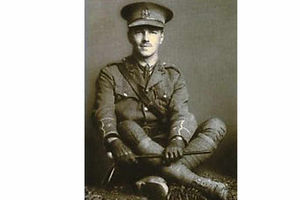Haunting words of Great War poet Wilfred Owen
His poems are among the finest and most evocative of the horrors of First World War battlefields ever written.

The best-known, Dulce Et Decorum Est, which graphically describes the effect of a mustard gas attack on a fellow soldier, has been part of the school curriculum for more than 40 years.
The power of Wilfred Owen's poems was borne of his experience, fighting alongside the soldiers whose lives he documented.
Tragically, killed in action, his fate also resembled those of many in the trenches, particularly heartbreaking as it came just a week before the war ended in November 1918.
His mother Susan received the telegram informing her of his death on Armistice Day, as the church bells were ringing out in celebration.
At the time of his death he was virtually unknown – only four of his poems were published during his lifetime – but he is now widely recognised as one of the greatest voices of the First World War.
Born in Oswestry in Shropshire in 1893, the railwayman's son, the eldest of four, was working in Bordeaux as an English teacher when war broke out.
He enlisted in October 1915 and, after training, was sent to the front in the Somme in January 1917 where he was severely shocked by an explosion and gassed.
He spent 28 hours holed up with the dismembered body of a fellow officer. When his nerves snapped,doctors declared him unfit to command and he was sent to Craiglockhart hospital in Scotland to recover.
There he met anti-war poet and fellow officer Siegfried Sassoon, his literary hero, who nurtured Owen's poetic genius. It was during his convalescence that Owen composed some of his most important works, including Anthem For Doomed Youth, Dulce Et Decorum Est, Futility and Strange Meeting.
In late August 1918 Owen returned to the Western Front after more than a year away and took part in the Hundred Days' Offensive, which would result in victory for the Allies.
He was awarded the Military Cross in recognition of his courage and leadership in helping to break the Hindenburg Line at Joncourt in October 1918.
On October 31, while taking refuge with his company in the cellar of a forester's house near the village of Ors, he penned his final letter to his mother Susan by candlelight. At that time he felt he was out of danger.
A few days later, on November 4, they were ordered to cross the nearby canal to attack the Germans holding the opposite bank.
At 5.50am, Owen and his 'D' Company of the 2nd Battalion Manchester Regiment, lined up in a heavy fog ready to attempt a crossing, supported by troops from other regiments, using rafts, pontoons and floating bridges constructed by the Royal Engineers.
However the bridges were quickly destroyed by heavy enemy fire, although two platoons of the Manchesters succeeded in crossing. Four Victoria Crosses were awarded, two of them posthumously, for the brave attempt to cross the Sambre-Oise canal at Ors.
Wilfred Owen did not survive. His friend 2nd Lt. Foulkes, who was wounded in the attack, said that Owen was last seen trying to cross the canal on a raft under very heavy gunfire. He was 25 years old.
The last line of his famous poem 'Dulce et decorum est pro patria mori' - It is sweet and right to die for your country' – was heavy with scorn and sarcasm.
It was intended not to induce pity but to shock the British public back home about the realities of war and to undermine the noble statement of patriotism. It was published posthumously in 1920.
There are memorials to Owen in Oswestry, where he was born, and Shrewsbury, where he grew up. He is buried in the village graveyard in Ors.
Dulce et Decorum Est
Wilfred Owen, 1893 - 1918
Bent double, like old beggars under sacks,
Knock-kneed, coughing like hags, we cursed through sludge,
Till on the haunting flares we turned our backs
And towards our distant rest began to trudge.
Men marched asleep. Many had lost their boots
But limped on, blood-shod. All went lame; all blind;
Drunk with fatigue; deaf even to the hoots
Of tired, outstripped Five-Nines that dropped behind.
Gas! Gas! Quick, boys!—An ecstasy of fumbling,
Fitting the clumsy helmets just in time;
But someone still was yelling out and stumbling
And flound'ring like a man in fire or lime...
Dim, through the misty panes and thick green light,
As under a green sea, I saw him drowning.
In all my dreams, before my helpless sight,
He plunges at me, guttering, choking, drowning.
If in some smothering dreams you too could pace
Behind the wagon that we flung him in,
And watch the white eyes writhing in his face,
His hanging face, like a devil's sick of sin;
If you could hear, at every jolt, the blood
Come gargling from the froth-corrupted lungs,
Obscene as cancer, bitter as the cud
Of vile, incurable sores on innocent tongues,—
My friend, you would not tell with such high zest
To children ardent for some desperate glory,
The old Lie: Dulce et decorum est
Pro patria mori.





